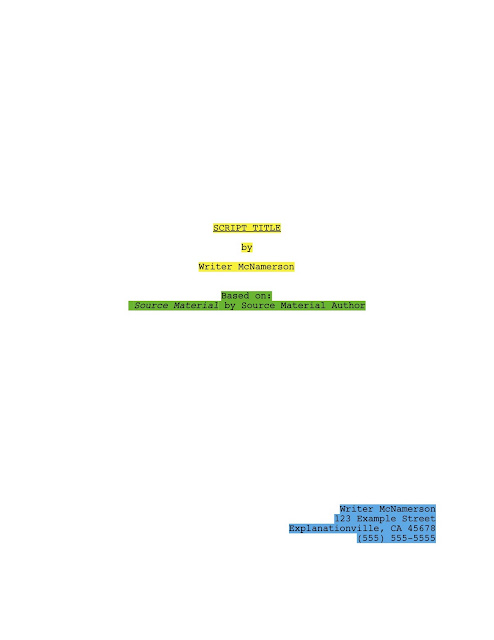Hello everyone, my name is Jeff and I’d like to welcome you to my new blog series: I Suck at Screenwriting. I’d like to start off with a little bit about me, but I’m afraid that I’d bore you to death.
SMASH CUT:
INT. C.IA. MENSROOM– DAY
JEFF MCNAMERSON (20’s, awkward, semi-likeable) is urinating all over the fresh corpse of AGENT SULLIVAN (40's, buff, fugly), it’s truly horrific.
JEFF
(To Sullivan’s Body)
Now who’s the pee-pee head?
I’m messing with you guys, I needed a catchy segue. This is my first example of terrible screenwriting, and look it’s homebrewed! Seriously though, we’re here to talk about fucking screenwriting. Get pumped!
We’re going to start where every good script starts: The title page. It’s actually vitally important to your script because your title page is likely the first thing anyone will ever see. If you blow it, they’re not even going to give you the customary ten pages worth of reading.
Before you ask, yes, I’m being serious. Some executives (Or more likely, their assistants) will read ten pages or less before they decide to abandon your script. That’s why first impressions are so important.
The title page generally divides into two separate sections: The title/byline and the writer’s contact information. Sometimes you’ll see the writer’s agent/manager, the production company, or the studio put their contact info on there too. But let’s be honest: if you had an agent or a script in production, you wouldn’t be reading this right now.
The title and byline (Highlighted in yellow) should always be roughly in the center of the page vertically and should be centered horizontally. The title appears in all caps, followed by a line break, the word ‘by’, another line break, and finally the author’s name. It’s pretty straightforward, but if you have questions about it, you can certainly feel free to email me at: ISuckAtScreenwriting@gmail.com.
For adapted materials (Highlighted in green), the source material is generally listed centered, one page break below the byline.
The writer’s contact information (Highlighted in pink) generally goes in the bottom right corner, left-justified, indented about six inches off of the left margin. You’ll need to put in your full name, address, and a phone number where you can be reached. Some writers and executives prefer to have the writer put his/her email address and telephone number, or just email address, but putting your phone number is still pretty much the standard. In Hollywood, people still use their phones, A LOT. The ratio of phone calls made/emails sent to actual work done is horrendous.
I’d like to end with a little bit of a riff on titles, since it’s semi-applicable to the current subject of title pages. A good title has become something of a lost art for most writers and filmmakers. In this day and age, the title has come to function as a stand-in for the script’s logline (A once to two sentence description of the script in it’s entirety). That is to say that the title is generally the writer’s/agent’s/studio’s/ad-executive’s first chance to sell his or her audience on this script or film. I’ll say it again: First impressions are important.
However, just because the title now serves a pretty straightforward purpose does not necessarily mean that it’s an easy feat. Quite the contrary, titles are extremely difficult. That’s why I find the current trend in movie title’s to be a bit disturbing. The title has been corrupted into the ultimate branding machine. Titles are what executives use to sell audiences on movies they haven’t seen before. Begging the question: Then what the hell is the trailer for?
That’s why we see so many GENERIC ACTION THRILLER 2 and TRENDY HISTORICAL GROUP VS. TRENDY MONSTER CREATION movies out there right now. When I first saw the trailer for COWBOYS & ALIENS:
(This is basically the original trailer, except they cut out the shots of Olivia Wilde and Daniel Craig during the credits)
I literally could not stop laughing when Harrison Ford says: “You’re gonna give him to me, or I’m gonna take him.” It’s awful. Somewhere along the line, someone saw this trailer and said: “We’ve made a huge mistake.” Now that they’ve fixed the trailer up a little bit, I’m actually considering seeing it.
But I digress, I’ve strayed too far from my original comment about titles. I recently read an quote by Mitchell Hurwitz (Creator of ‘Arrested Development’ and ‘Running Wilde’), that I think perfectly captures my thoughts about titles:
“…if you were to call the show "Welcome Matt", an audience could immediately understand the concept: this must be a character named Matt and he must either be a welcoming person or stepped on. If you call a show "Arrested Development" it's confusing and sufficiently disorientating to guarantee that a wide audience never discovers the fruits of your labour.”
This is word for word what I might’ve said, only written with far more grace than I am capable of (Also, I love that you can tell he’s British just by how he spells ‘labor’).
To me, the title is very much the first selling point of your script. It’s vitally important to get it right. That’s why so many projects here in Hollywood start off with such inventive titles as UNTITLED ALIEN PROJECT before inevitably becoming something more impressive like ALI3N, MARS NEEDS MOMS, or COWBOYS & ALIENS. You get my point.
Just take a little while to think of a clever title for your script. There’s no need to rush it. Hell, you can wait until the posters are being printed if you want to. The point is simply to make a title that stirs up a modicum of brain activity in the average dumb American.
Or, I guess there’s always financing for CELESTIAL SPACE BATTLE PROJ3CT if that’s what you’re into.

No comments:
Post a Comment